- Home
- Charlie Higson
The Enemy
The Enemy Read online
Text copyright © 2009 by Charlie Higson
First published in the U.K. by Puffin
All rights reserved. Published by Hyperion, an imprint of Disney Book Group. No part of this book may be reproduced or transmitted in any form or by any means, electronic or mechanical, including photocopying, recording, or by any information storage and retrieval system, without written permission from the publisher. For information address Hyperion, 114 Fifth Avenue, New York, New York 10011-5690.
Printed in the United States of America
First U.S. edition, 2010
1 3 5 7 9 10 8 6 4 2
V567-9638-5-10060
Map illustration by Kayley LeFaiver
Library of Congress Cataloguing-in-Publication Data on file
ISBN 978-1-4231-4504-2
Reinforced binding
Visit www.hyperionteens.com
Table of Contents
1
2
3
4
5
6
7
8
9
10
11
12
13
14
15
16
17
18
19
20
21
22
23
24
25
26
27
28
29
30
31
32
33
34
35
36
37
38
39
40
41
42
43
44
45
46
47
48
49
50
51
52
53
54
55
56
57
58
59
60
61
62
63
64
65
66
67
68
For Sidney
Small Sam was playing in the parking lot behind the Waitrose supermarket when the grown-ups took him. He’d been with some of the little kids, having a battle with an odd assortment of action figures, when it happened. They weren’t supposed to play outside without a guard, but it was a lovely sunny day and the little kids got bored indoors. Sam wasn’t the youngest of the group, but he was the smallest. That’s why they called him Small Sam. There had originally been two other Sams, Big Sam and Curly Sam, who had curly hair. Big Sam had been killed a few months ago, but Small Sam was stuck with the name.
It was probably because of his size that the grown-ups went for him. They were like that—they picked out the youngsters, the weaklings, the little ones. In the panic of the attack the rest of Sam’s gang got back safely inside, but Sam was cut off and the roving pack of grown-ups trapped him in a corner.
They had come over the side wall, led by a big mother in a tracksuit that might once have been pink but was now so filthy and greasy it looked like gray plastic. She had a fat, egglike body on top of long skinny legs. Her back was bent and she ran stooped over, but surprisingly fast, her arms held wide like a scorpion’s claws, her dirty blond hair hanging straight down. Her face blank and stupid. Breathing through her mouth.
Small Sam was too scared even to scream or call for help, and the grown-ups made no noise, so the whole scene was played out in horrible silence. The mother blocked off the route back toward the building while two lanky fathers ran at him from either side. Sam dodged them for a few seconds, but he knew they’d get hold of him in the end. By the time help came from inside, the grown-ups had gone back over the wall, with Sam stuffed inside a sack.
Maxie led a group of bigger kids out into the parking lot. Even though they were armed with spears and clubs and good throwing rocks, they moved cautiously, not knowing exactly what to expect.
“We’re too late,” said Callum, scanning the empty parking lot. “They’ve got him.”
“Shame,” said a stocky, dark-haired kid called Josh. “I liked him. He was funny.”
“That’s the second attack this week,” said Maxie angrily. “What’s going on? Either the grown-ups are closing in on us, or they’re getting braver.”
“They ain’t brave,” said Josh, spitting on the ground. “If they was still here I’d show them brave. I’d mash their ugly faces. Nothing scares me.”
“So why were they here?” asked Maxie.
“They’re just hungry,” said Josh.
“We’re all hungry,” said Callum.
“We should have been here,” said Maxie. “We should have been watching over them.”
“We can’t be everywhere at once,” Callum pointed out. “There’s not enough of us, not with Arran out with the scavs. Our job’s to keep a lookout from the roof. The little kids knew they weren’t supposed to be out here. Nobody should be out here. We should all stay inside.”
“We can’t stay inside all day,” scoffed Josh. “We’d go crazy.”
“It’s good inside,” said Callum.
“You’re just scared to come outside,” said Josh with a smirk.
“No I ain’t,” said Callum. “No more scared than you.”
“Nothing scares me,” said Josh.
“Then you’re just stupid,” said Callum.
“Nah,” said Josh. “The thing about grown-ups is, some of them are strong, some of them can run fast, and some of them are clever, but the strong ones are slow, the fast ones are stupid, and the smart ones are weak.”
“Tell that to Small Sam,” said Maxie angrily, “and to Big Sam and Johnno, and Eve and Mohammed and all the other kids we’ve lost.”
“Grown-ups won’t get me,” said Josh.
“What?” said Callum. “So it was their fault they got taken? Is that what you’re saying?”
“Yeah, I am,” said Josh.
“Shut up,” Maxie snapped at the two of them. Then she said the thing that nobody wanted to admit. “We can’t go on like this.” Her voice was heavy with bitterness. “Soon we’re all going to be dead. I can’t stand it anymore.”
She threw down the spear she had been carrying and sat on the ground, resting her head in her hands.
It was her fault. That was all she could think. It was all her fault.
When Arran was away she was supposed to be in charge. She couldn’t remember when it had been decided—Arran was the leader, she was second in command—it must have happened early on, when most of the kids had been too frightened and confused to do anything for themselves. Arran and Maxie had just got on with it, organizing everyone, keeping their spirits up. Arran was clever and likeable. Right from the start he’d kept his head and not panicked. He’d been captain of the soccer team at William Ellis School, and nothing ever seemed to freak him out. The two of them had worked together. A team. Maxie had always been good at getting other children to help out. There were better fighters than her, true, but they were happy for her to tell them what to do. They didn’t want the responsibility. And when Arran wasn’t there, she was the leader.
So, it was all her fault. Another kid gone. She shut down part of her mind. She didn’t want to think about what the grown-ups would do to Small Sam.
She started to cry. She didn’t care who saw it. Callum looked at Josh. They both felt awkward. In the end it was Josh who squatted down next to her and put an arm around her shoulders.
“It’s all right, Max,” he said quietly. “We’ll be all right. Something’ll happen, someone will come. Something’s gonna change.
When Arran and the others get back we’ll talk about it maybe, yeah? Make a plan?”
“What’s the point?” said Maxie.
“When Arran gets back, yeah?”
Maxie looked up into Josh’s concerned, grubby face. “Sorry,” she said.
“Come on,” said Callum. “Let’s try and find out how they got over the wall. Then we should get back inside.”
“Yeah.” Maxie jumped up. It was okay as long as you were doing something, as long as you didn’t stop and think.
She wished Arran were here, though. She always felt safer when he was around.
It was just . . . What was he going to think?
Another kid gone.
All her fault.
A burster was lying in the middle of the road. A father by the looks of it, though it was hard to tell. He had the familiar look of a vegetable, or a piece of fruit, left too long in the sun. The skin blackened, shriveled and split, the overripe flesh inside squeezing out. His insides had turned to mush. This was what happened if any grown-up lived long enough to let the disease run its full course. They literally burst.
Arran prodded the body with his sneaker. As he did so, the skin popped, and a stream of pus oozed out, followed by a bright pink blossom of soft fat.
Arran was leading the scavenger party. Tall, fair-haired, and athletic, he had a knife in his belt and carried a pickax handle as a club.
“Gross,” sniggered the boy at his side, who had a shock of curly hair bleached almost white.
“Come on. We don’t have time for this.” Arran turned his back on the corpse and continued up Holloway Road. When the disaster first happened the kids had been appalled and fascinated by dead bodies. Now they were used to them. They hardly even noticed them. A burster, though, was still a little special.
The scavenger party took up their positions with Arran and trudged on. They hadn’t gone another hundred yards, however, before the bleach-haired boy, Deke, slowed down.
“What’s that?”
They stopped and listened.
“Dogs,” said another boy, and he moved to the front. He was shorter than Arran and not as strong. He had proved time and time again, though, that fighting was not all about strength. Arran was the leader, but Achilleus was the best fighter of them all, with a wiry build, dark eyes, and olive skin. He spent most of his spare time shaving elaborate patterns into his short hair. He could be moody and sarcastic and quick to lose his temper, but nobody much minded because he’d saved them all many times with his combat skills. He moved fast, used his brain, and was utterly ruthless in a fight.
They waited. They could hear the dogs long before they saw them. A cacophony of howling, yelping, and barking. All jumbled together, it sounded like a single mad beast.
Achilleus leveled his spear, pointing it toward the noise. It was made from a metal spike he’d found on a building site. It had a heavy lump at one end, and he’d sharpened the other into a vicious point. It was perfect for keeping grown-ups at bay. He could stab with the front and use the back end to batter them. It was definitely not for throwing. Too precious for that.
Arran took up a defensive position behind him, next to Freak and Deke. Freak and Deke were a team, best mates. Before the disaster they’d taken to the streets armed only with spray cans. Their tag was “Freaky-Deaky,” and it could be seen all over Tufnell Park and Camden Town, sprayed on walls and shutters, stenciled on to the sidewalks, scratched on the glass in bus shelters. They knew all the back ways, all the alleys and shortcuts. Freak, whose real name was David, had close-cropped hair and a thin, pinched face. He was always sniffing. Deke was the bigger of the two. He was good looking and would have been popular with the girls if he hadn’t spent all his time with Freak. The two were inseparable, always finishing each other’s sentences and laughing at each other’s jokes. Freak carried an ax and Deke a sledgehammer. They were mainly for knocking down doors and opening windows, although, if needed, they could be used as weapons.
The last in the group was Ollie. Small and red haired, the cleverest of them all. He had sharp eyes and could think quickly. He kept himself to himself, and most of the time he kept quiet. But when he did speak, people listened. Arran would often ask Ollie for advice, and it was never seen as a weakness. Ollie always knew the best thing to do.
As the barking of the dogs grew louder, Ollie stepped back and to one side, keeping a clear line of sight. His weapon was a slingshot that he had taken from a sports shop. It was a powerful hunter’s model, with a pistol grip and a metal brace that fitted over his forearm. He drew the rubber band back and tucked a heavy steel ball into the worn leather pouch.
Whenever the kids were outside of camp, they traveled in groups of at least four. One to look ahead and lead the way, two to check the sides, and one to watch their backs. But, as Freak and Deke always worked together, there were five of them today. They had learned early on to move down the middle of the roads, rather than to stay out of sight among the buildings along the sides. Grown-ups could hide in the shadows and grab you from the darkness. They weren’t such a threat in the open, because on the whole they didn’t move fast enough. The biggest danger was if you got surrounded.
In a mass the grown-ups were a real threat, bigger and heavier than the kids, and diseased. Grown-ups were rarely organized enough to plan any real strategy, though, and for the most part they came lumbering out in a pack from the side. Then the best thing to do was run.
Anything to avoid a fight.
Dogs were different, however. Unpredictable. Dangerous.
“Are they coming our way?” said Freak, scratching his stubbly head.
“Think so,” said Ollie, his slingshot creaking.
“Let them,” said Achilleus. “I’m ready.”
“It gets more dangerous every time we come out,” said Arran.
“Tell me about it,” said Deke, nervously twisting his sledgehammer in his hand.
Then the first of the dogs appeared, a skinny mongrel with one eye. It bowled out into the street, fell over, wriggled on the ground, then lay on its back in surrender. A second dog was hard on its tail, a dirty pit bull. It had evidently been chasing the mongrel, because it came at him with teeth bared and hackles raised.
There was an almost comical moment when the two dogs realized that they had an audience. They both did a double take and looked at the boys in surprise. The rest of the pack came into view at almost the same time, howling and barking.
They skidded to a halt and a couple of them knocked into the pit bull, who turned and snapped at them.
The little mongrel saw its moment and scurried off. The pit bull stood there, sniffing the air. The other dogs were a mismatched mob, with missing fur and diseased eyes caked with pus. Some were limping, some wounded. One sat down in the road and vigorously scratched its ear, until another dog bit it and it scampered away.
The pit bull strutted forward, growling, then it started to bark at the boys, and the rest of the pack joined in. Instantly the street was filled with their racket.
“Will they attack, do you think?” asked Freak.
“Depends how hungry they are,” said Arran.
“They look pretty hungry to me,” said Deke, and he gripped his sledgehammer tighter.
“Try and scare them off,” said Arran, and the boys now made a racket of their own, yelling and screaming and waving their arms. Some of the dogs backed off, but the bolder ones were soon inching closer.
The big pit bull shook his head and nosed ahead, his claws scratching on the asphalt.
“Take him out,” said Arran. “He’s the boss. Maybe the others will get the message.”
Ollie loosed his shot. The steel ball hit the dog squarely in the forehead, his legs crumpled, and he went down without a sound. The other dogs sniffed him, and one or two set up howling. Then a big German shepherd ran from the back of the pack, leading three other hounds with him. Achilleus went down on one knee, and as the dog pounced, he stuck him through the chest with his s
pear. The followers veered off to the side, and Ollie hit one more with a steel ball, breaking its leg. It yelped and turned tail, dragging its leg behind.
With a great war cry, the boys charged, and the rest of the dogs scattered.
Ollie quickly searched the area for his ammunition. He found his second ball lying in the gutter. The first one was stuck in the pit bull’s head in a neat crease of broken bone.
The five of them knelt by the dead body.
“Can we risk eating it?” said Freak. “What’s that parasite Maeve’s always going on about? That worm thing you can catch from eating dog? Tricky something.”
“Trichinosis,” said Arran. “He’ll be all right if he’s well cooked.”
“Yeah,” said Deke. “We’ll deep-fry him in batter, with some fries and a nice glass of wine. Delicious.”
Freak giggled. “I know a gourmet recipe for fried dog.”
“We can’t waste any food,” said Arran. “Some of the kids are getting really thin. Leave the German shepherd, though. He’s too big to carry and his carcass might keep the pack busy.”
Achilleus took out his knife and gutted the dead animal, leaving the purple-gray entrails in the road to further distract the other dogs.
He then tied the dog’s legs together with some nylon cord and slung it over Arran’s shoulder.
“Should we go back?” said Freak.
“We need to find as much food as we can,” said Arran. “It’s always a risk leaving camp, and it gets riskier every time. The dog’s not enough for twenty of us.”
Every day a scavenging party left the camp to look for supplies. They searched among the empty houses and apartments for any abandoned cans, packages, and bottles. Each time they had to start their search farther from Waitrose. All the buildings close by had long since been picked clean. Most days they found nothing, but a lucky discovery could last them a long time.
They knew it couldn’t last, though. They had already been through every accessible building within a mile of Waitrose, except around Crouch End, which had been destroyed in a fire, and up around the Arsenal soccer stadium, where there was a large nest of grown-ups.
Sooner or later they would have to move camp.
But where would they go?
Arran pushed his hair out of his eyes. His guts hurt. He didn’t really feel hungry anymore, just sick and tired. He’d grown to hate these streets. The smell of them, the filth everywhere, the grass and weeds pushing out of every crack, the constant fear chewing away at him. He had been happy at first when they’d made him leader, but then it slowly dawned on him that he was responsible for everyone else. If anything went wrong he had to take the blame. That was why someone like Achilleus, who could easily beat him in a fight, was happy not to be in charge. He could show off and suck up the praise, but when a tough decision had to be made, he would sit back, hold up his hands, and let Arran sweat it out.

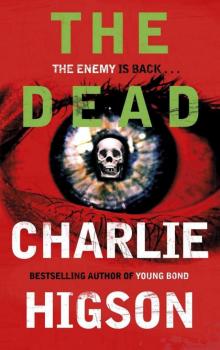 The Dead
The Dead The Sacrifice
The Sacrifice The Fallen
The Fallen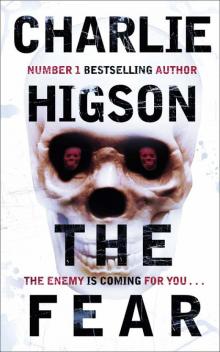 The Fear
The Fear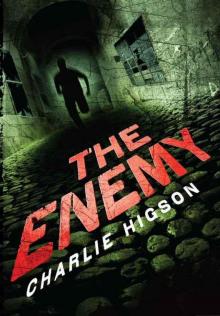 The Enemy
The Enemy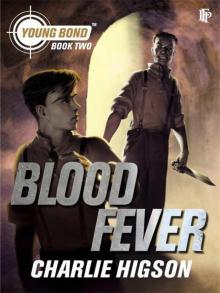 Blood Fever
Blood Fever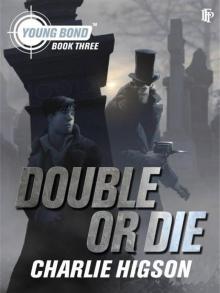 Double or Die
Double or Die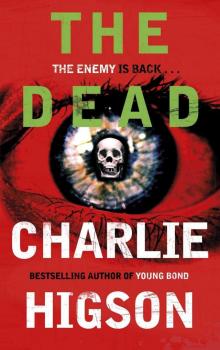 Young Bond, The Dead
Young Bond, The Dead The Hunted
The Hunted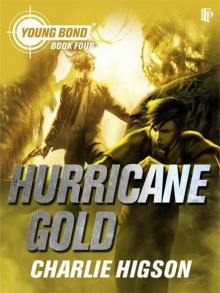 Hurricane Gold
Hurricane Gold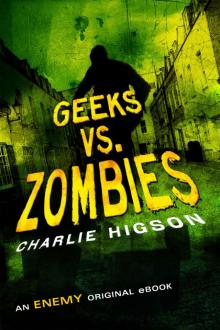 Geeks vs. Zombies
Geeks vs. Zombies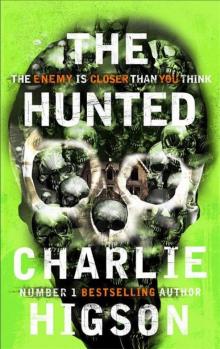 The Hunted (The Enemy Book 6) (Enemy 6)
The Hunted (The Enemy Book 6) (Enemy 6)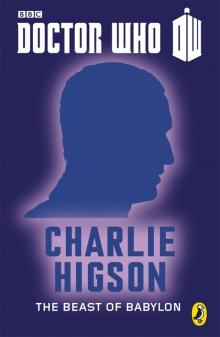 The Beast of Babylon
The Beast of Babylon